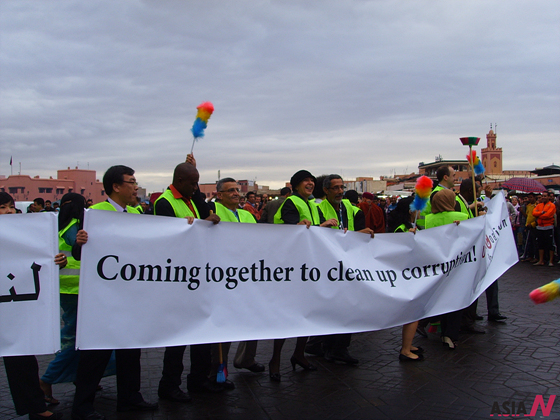Coming Together to Clean up Corruption!
Civil Society Voice from Berlin and Marrakech
Injustice, violence, and threat to sustainability: current global crises are closely related with corruption.
It is also a serious hindrance to fulfilling the Millennium Development Goals. Last month, two important international conferences were held in this regard.
More than 400 people from the Transparency International movement gathered in Berlin from 14-16 October for its largest ever Annual Membership Meeting. The movement adopted resolutions on aid effectiveness, government accountability in the Middle East and North Africa region, anti-corruption mechanisms for climate change finance, G20 action on stolen assets, and the Fourth Session of the UNCAC Conference of States Parties.
Especially, the final resolution emphasized the necessity of non-governmental inputs to the Implementation Review Group (IRG) and requested “UNODC to prepare a Third Guide, with a focus on building sustainable ethical infrastructure, to assist state parties and non-state actors in furthering integrity”.
One week later, fourth session of the Conference of the States Parties to the United Nations Convention against Corruption was held in Marrakech, Morocco (24-28 October 2011). In spite of the applicable rules of procedure, as explained by the UN Office of Legal Affairs, some governments wanted to continue blocking civil society participation in IRG.
“The decision not to include civil society leaves things dangerously open-ended during a critical period in which the convention review process is still being shaped and when there is a need in the region and beyond for a strong and inclusive convention,” said Slagjana Taseva, Madam Chair of the UNCAC Coalition, a global network of over 310 civil society organisations (CSOs) in over 100 countries, speaking from the conference in Marrakesh. “In deciding against civil society participation, governments have shown themselves to be out of touch with their own people and on the wrong side of history.”
In a round of horse-trading, governments reached a poor compromise that dramatically narrows access for civil society organisations. Instead of full observer status they will only have access to so-called briefings on the work of the review group. But the UNCAC Coalition emphasised that anything less than full observer status is unacceptable and contravenes the applicable rules of procedure. The disappointing final outcome stood in stark contrast to public statements of support from many governments.
The review process is off to a promising start with six country reviews completed and with most including country visits. However, the reports themselves show a number of shortcomings in Convention enforcement and underscore the need for a transparent, inclusive and well-funded review process.
There was good news for civil society organisations ahead of the conference when the United Nations published summaries of thirteen civil society reports and an overview report, prepared by the UNCAC Coalition and Transparency International, on progress in Argentina, Bangladesh, Brazil, Bulgaria, Chile, Lithuania, Mongolia, Morocco, Papua New Guinea, Peru, Ukraine, the United States and Vietnam in implementing the Convention. The bad news was that the review process at country level too often remains opaque with civil society shut out from making inputs.
There were some welcome developments during the conference in Marrakesh, namely a commitment on the prevention of corruption agreed by states and the strengthening of the stolen asset recovery framework, an issue that is particularly important to countries such as Egypt, Libya and Tunisia, and others that have seen public money siphoned off by corrupt elites and stashed overseas. But the effectiveness of these measures may ultimately undermined by the absence of a civil society voice.
“It is tragic that the momentum provided by the Arab spring on the return of stolen assets did little to solidify the role of civil society in convention enforcement, although a strong citizen voice was the central element of the uprisings in the region,” said Christiaan Poortman, the head of Transparency International’s delegation at the UN conference in Marrakesh. “After four years of struggling to cement the role of civil society in the UNCAC review process we face the disheartening prospect of being locked out for another two years, a setback for the global fight against corruption that will ultimately impact ordinary citizens worldwide”.




























































IJWTS wow! Why can’t I think of tihngs like that?
Very interesting info!Perfect just what I was searching for!